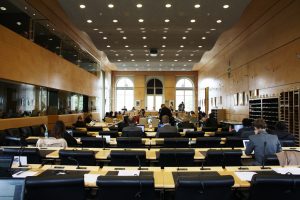
The Eurasian Harm Reduction Association (EHRA) and the Canadian HIV/AIDS Legal Network, together with communities of people who use drugs from Estonia and Kazakhstan are presenting two parallel reports to the 62nd Pre-Sessional Working Group of the UN Committee on Economic, Social and Cultural Rights (CESCR), which is meeting in Geneva this week. Today, representatives from EHRA and Estonian organisation of people who use psychoactive substances LUNEST will give their statements regarding the enjoyment of social rights among women who use drugs and/or living with HIV in Estonia. On 4 April, during the discussion of the report from the Government of Kazakhstan, the issue of access to opioid maintenance therapy (OMT) and the protection of human rights of drug-dependent individuals and people living with HIV in the country will be raised.
Both parallel reports were written based on the disturbing information on the situation with people who use drugs that demonstrates that human rights of these groups of society in Estonia and Kazakhstan are gravely violated.
In case of Estonia, its Government is requested to address the issues of health, parental, child protection, and labor rights violations incurred by women who use drugs. These violations were detected during a research study conducted by a team of non-governmental organisations in 2017. Despite the fact that Estonia, compared to other post-Soviet states, has made good progress providing access to HIV prevention and treatment, violations of human rights against people who use drugs, their discrimination and stigmatisation is still an everyday occurrence, especially on behalf of state institutions, such as the police, child protection, and public health services.
The Government of Kazakhstan will be urged to provide information regarding the future of OMT programs, since the outcomes of the state’s assessment in 2017 may lead to the complete halt of these programs in the country. This is not the first time that CESCR is dealing with the issue of OMT in Kazakhstan: in 2010, the Committee called on the Government of Kazakhstan to ensure that methadone as substitute drug dependence therapy was made accessible to all drug dependents. However, by the end of 2017, OMT was available to only 2.69% of all injecting drug users on the outpatient register, contrary to World Health Organisation’s recommendations of at least 20% coverage.
According to Dasha Matyushina-Ocheret, Policy Reform Advisor at EHRA, parallel reports and testimonials at the 62nd Pre-Sessional Working Group of the CESCR should help raise the issues of human rights violations in Estonia and Kazakhstan on the international level so that lives of people who use drugs are improved. “It is especially important that members of the Working Group, as well as Government representatives from Estonia and Kazakhstan, will hear first-hand accounts from community representatives on how their rights are violated,” says Ms. Matyushina-Ocheret.
Established in 1985, CESCR is a UN human rights body consisting of 18 independent experts that monitor implementation of the International Covenant on Economic, Social and Cultural Rights by its States parties, which are obliged to submit regular reports to the Committee on how the rights are being implemented in their countries. The Committee’s rules allow for international, regional, and national organisations and human rights institutions to submit parallel reports with questions for governments in advance of the dialogue with the states.
